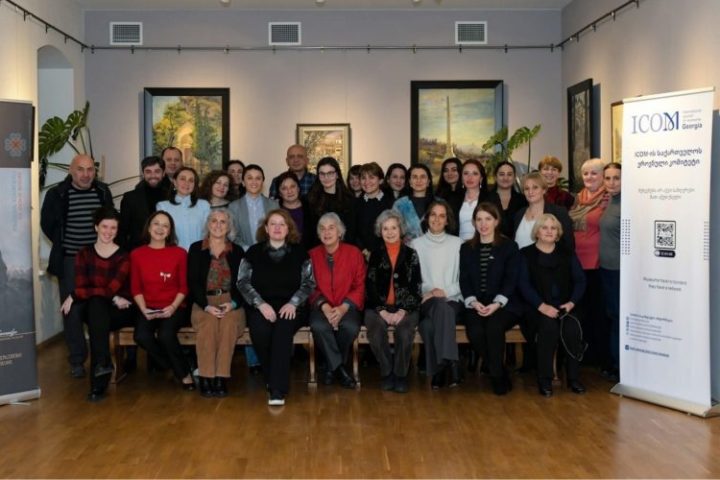January 18, 2025
Strengthening Heritage Safeguarding: Report on ICOM Europe 2024 Training Series in Tbilisi Report, Training

The ICOM Europe 2024 Training Series “Heritage Resilience: Safeguarding Cultural Legacy in Crisis Zones,” provided an active platform for 26 Georgian and international museum professionals, as well as representatives from the Georgian National Guard, to enhance their capacity for protecting cultural heritage in crisis-prone regions. Hosted at the Ilia Chavchavadze Literary-Memorial Museum in Tbilisi, the program combined theoretical and practical approaches to equip participants with essential tools for emergency preparedness and response.
Spanning three days from 25–27 November 2024, the series addressed a range of interconnected themes critical to safeguarding heritage, including Disaster Risk Management, Emergency Evacuation, Documentation and Restoration, People-Centered First Aid, and Crisis Communication.
The project is funded by the ICOM International SAREC Grants and was organized and supported by ICOM Europe and ICOM Georgia, in collaboration with ICOM international and national Committees including ICOM DRMC, ICOM MPR, ICOM France, ICOM Austria, ICOM Belgium, ICOM Italy, and Blue Shield France, Blue Shield Georgia, Opificio delle Pietre Dure, Istituto Centrale per il Restauro, and the Tbilisi Museums Union.
Program Overview
Day 1: Disaster Risk Management and Preparedness
The opening day focused on preventive measures for safeguarding cultural heritage against natural and man-made disasters. Giuliana Ericani, Chair of the ICOM European Regional Alliance, led a session “Risk and Preventive Safety in Museums: Ethical Obligations in the Light of ICOM Rules.” Giuliana emphasized the ethical responsibilities of museums to proactively address risks, aligning their practices with ICOM regulations and European standards. Her presentation highlighted the significance of the 1954 Hague Convention in ensuring the protection of cultural heritage during armed conflicts.
The afternoon session, led by Alessia Strozzi of ICOM Italy, focused on “Endangered Heritage: Emergency Evacuation Procedures.” Alessia used real-world examples and interactive exercises to help participants identify evacuation priorities, create safe havens for collections, and develop clear communication protocols for emergencies. The day concluded with a guided tour of the Ilia Chavchavadze Literary-Memorial Museum, allowing participants to observe the practical challenges of protecting cultural heritage in a local context.
Day 2: Evacuation Procedures and First Aid for Heritage
The second day began with an introduction to Blue Shield Georgia’s activities in heritage protection, delivered by its Chair, Tamar Sopromadze. This session set the basis for understanding the importance of local and international collaboration in addressing crises.
Claire Leger from Blue Shield France presented on “Preparation/Planning: Key Steps for Drafting a Cultural Heritage Safeguarding Plan.” Drawing on the principles of the 1954 Hague Convention and utilizing the C2RMF methodology, Claire guided participants through the essential components of creating a Cultural Heritage Safeguarding Plan. These included identifying priority works, preparing safe havens, and organizing emergency resources. Participants engaged in practical exercises, adapting these strategies to their institutional contexts.
In the afternoon, Deborah Ziska, Chair of ICOM MPR, led a session on “Dare to Dream: Communication and Empowerment – From Conflict Zones to the Global Community.” Together with Ukrainian experts, including Ihor Poshyvailo and Vasyl Rozhko, Deborah highlighted the importance of crisis communication, digitization, and community involvement in preserving cultural heritage. Group activities allowed participants to develop communication protocols, simulate emergency scenarios, and exchange best practices.
Day 3: Documentation and Restoration Techniques
The final day focused on documentation and restoration techniques, with experts from the Istituto Centrale per il Restauro (ICR) sharing their expertise.
Maria Elena Corrado opened with a session on “Management of Cultural Heritage (CH) Debris and Emergency Management Systems.” Using case studies from earthquake recovery efforts in Central Italy, she detailed the processes for managing cultural heritage debris and introduced tools such as GIS-based risk mapping.
Francesca Capanna followed with a session on “Art Objects Recovery, Conservation, and Safety in Emergencies.” She shared practical, cost-effective methods for artifact recovery and emphasized the importance of establishing temporary deposits and administering first aid to damaged objects. Participants engaged in group exercises to apply these techniques, practicing documentation and preparation for evacuation.
The ICOM Europe 2024 Training Series addressed the critical need for enhanced preparedness among museum professionals. Over three days, the program provided theoretical insights with practical exercises, enabling participants to acquire tools essential for managing cultural heritage during crises. Feedback from participants highlighted the value of the ethical discussions, real-world applications, practical and interactive activities in meeting their professional needs.
Future Directions
Building on the success of this training series, future initiatives could aim to expand and adapt to evolving challenges:
- Broadening the Scope: Including new topics like digital preservation, post-crisis recovery, and climate resilience.
- Addressing Emerging Threats: Developing strategies to counter climate-related risks and digital vulnerabilities.
- Strengthening Networks: Encouraging cross-border collaborations to share expertise and resources.
- Supporting Continuous Learning: Creating digital platforms for ongoing access to training materials, case studies, and professional development opportunities.
By fostering global collaboration and proactive planning, the ICOM Europe 2024 Training Series has laid a foundation for a more resilient and prepared heritage community.